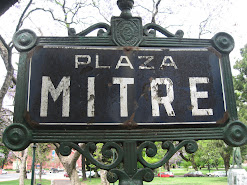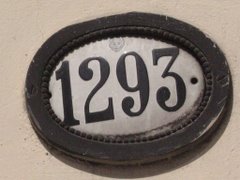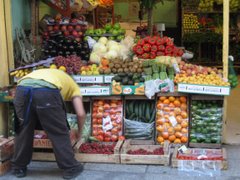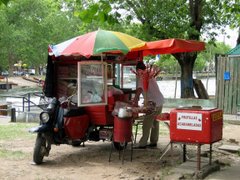
Is Argentina on the road to redemption or the highway to hell? President Nestor "the Penguin" Kirchner received accolades for his leadership following the 2001 crisis, but a four year period of growth masks severe problems his wife Cristina will inherit as the next head of state. The economy's building blocks are like the ubiquitous hollow bricks of Buenos Aires' frantic construction boom. But Argentina's economic infrastructure is little more than a house of cards.
On Thursday, the government reported an inflation rate of just .6% for the month of August, but some analysts say the real level may be more than twice that (meaning an annual rate of 15%). Official figures have been coming in low since January, when President Kirchner replaced key officials at the national statistics agency INDEC (now disparagingly called INDEK by some). Quoting the Financial Times, "economic growth of more than 8 per cent since the 2002 crisis, booming demand fueled by cheap utilities, and industrial capacity that is stretched to the limit, has proved a triple whammy for prices."
On Thursday, the government reported an inflation rate of just .6% for the month of August, but some analysts say the real level may be more than twice that (meaning an annual rate of 15%). Official figures have been coming in low since January, when President Kirchner replaced key officials at the national statistics agency INDEC (now disparagingly called INDEK by some). Quoting the Financial Times, "economic growth of more than 8 per cent since the 2002 crisis, booming demand fueled by cheap utilities, and industrial capacity that is stretched to the limit, has proved a triple whammy for prices."
Election day is Oct 24th, and Cristina K is the clear front runner against an impotent opposition, but that hasn't stopped hubby from doling out over $1,000,000,000 in classic "happy October" populist handouts in the form of tax rebates, pension and salary increases, and family benefits. The free lunch party may help to maintain economic growth, but is also likely to accelerate inflation. Cristina claims that "political and financial interests" have sought to inflate inflation (numbers). But voters can see exactly how much less their paychecks buy when they set up to checkout counters at supermarkets like Jumbo and Disco. Unfortunately, when it comes time to step up to the ballot box, there won't be any charismatic rival to vote for. The "financial interests" the future president speaks of are the very legitimate holders of inflation-indexed bonds which were introduced when the country restructured its defaulted debt in 2005. If inflation really is 15% the government is underpaying by billions of dollars per year.
Prices are rising rapidly despite government subsidies and price controls achieved by means of strong arm pressure tactics on industry. And price increases are fueling wage demands which are constant. The government has boxed itself into a conundrum that could eventually lead to stagflation - a period of out-of-control inflation combined with very slow, or no, output growth. The president must reduce spending to tame inflation, but that could hurt demand and increase unemployment. (Cristina, who is known to have little interest in economics, has signaled that she will reduce spending and increase the surplus).
In neo-classical economic theory, stagflation "is rooted in the failure of the overall market to allocate goods and services efficiently." And that failure can be caused by excessive government regulation (price controls). In Argentina, changes in monetary policy and deregulation are needed to allow supply and demand to do its thing in a free market. Unfortunately the Kirchner government has shown no capacity to change the way it does business. It's central-planning style has done serious damage to the free market system and chased away much needed investment.
The government's price control bad cop, Guillermo Moreno, is the man in charge of clumsy price negotiation (coercion) efforts. In the case of beef, the government cut off exports in an attempt to force down prices on the local market. Moreno is now in legal hot water for a side project - the infamous new and improved INDEC numbers - and his fate is unknown for now. If a case like his gets to the supreme court, the K's have little to fear since the judges are in their pocket.
President Kirchner feels that he won a big victory for Argentina against the IMF, and that US puppet organization did deserve, and did take, part of the blame for the crisis of 2001. But the government is now trying to borrow $10 billion from the World and Inter-American Development Banks, and a group called the American Task Force Argentina, which represents holders of $20 billion in defaulted debt, is working hard to block the loan. These bond holders sat out a 2005 restructuring in which Argentina paid just 30 cents on the dollar. Argentina also "faces more than 100 lawsuits in the US alone and further legal action in Europe, preventing it from tapping international capital markets for fear of assets issued being seized." The country has been able to avoid that threat thanks in part to investments made by Hugo Chavez.
Cristina is walking into a real mess and when things go from bad to worse it will be impossible for her to blame the prior president. (Hillary is in a better spot in that regard). Cristina will have to take the heat on her own, although Nestor, who may have failed to mention problems x, y or z, will be spending a lot of nights sleeping on the couch.
Argentina has another date with crisis unless major changes are made now.



























































































2 comments:
welcome back!
besos,
Mimi
amo tus fotos!
Hi Chris,
Welcome back to blogging. An interesting bunch of posts you've written this week.
No surprises though really - Argentina crashes every ten years, doesn't it? Since I've left my friends back there have been complaining about the price rises there big time. And inflation is what starts every crash they've had... you can see why Kirchner hates foreign companies though, since the man in the street hates foreign ownership of Argentine assets, and indeed blames the sale of said assets by Menem for causing the last crash.
Post a Comment